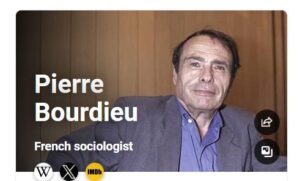Well, I only discovered my theoretical framework of analysis into Chapter Three. It was tucked away in an insignificant reference made by the famous Akhil Gupta in his key article Blurred Boundaries on postcolonial bureaucrats, bribes and a lot on sovereignty and else. The reference to Bourdieu was insignificant:
Research on the state, with its focus on large-scale structures, epochal events, major policies, and “important” people (Evans et al. 1985; Skocpol 1979), has failed to illuminate the quotidian practices (Bourdieu 1977) of bureaucrats that tell us about the effects of the state on the everyday lives of rural people. (Gupta,1995 p. 376)
I am convinced that there is a God of Sixth Sense or a metaphysical power that guides me unconsciously to things that I am hardly aware of, that I need, and that are invisible. What possessed me to look up Pierre Bourdieu remains a mystery. I ordered an Outline of a Theory of Practice and never looked back since. It wasn’t easy to get a grip on the stuff as Pierre tends to be write long convoluted sentences which gain layers as he developed his conceptual tools:
 habitus, doxa and illusio. He preferred to call em ‘relational conceptual approaches’ making sure no one misunderstood them as being static concepts.From a rich textured pile of interview research, I turned out a Bourdieusian Exploration into Schooling-in-Wartime in Northern Sri Lanka. I know they will pick holes in it especially on the Transcultural Transferability of PB among others, but he has been used in postcolonial contexts. Well, it is all done and submitted and yes, it half-killed me!
habitus, doxa and illusio. He preferred to call em ‘relational conceptual approaches’ making sure no one misunderstood them as being static concepts.From a rich textured pile of interview research, I turned out a Bourdieusian Exploration into Schooling-in-Wartime in Northern Sri Lanka. I know they will pick holes in it especially on the Transcultural Transferability of PB among others, but he has been used in postcolonial contexts. Well, it is all done and submitted and yes, it half-killed me!
Collateral damage: Social life due to self-imposed isolation, 8 kg weight gain, not enough income, seven abandoned clear-up projects but…. nothing compares to the sense of ‘I dunnit! All by my wee self too’ feeling when you press ‘submit.’ Thank you UoE! Yr library resource access was open sesame to a Third World citizen who never fails to be vowed by books at fingertips and most in full-text online.

